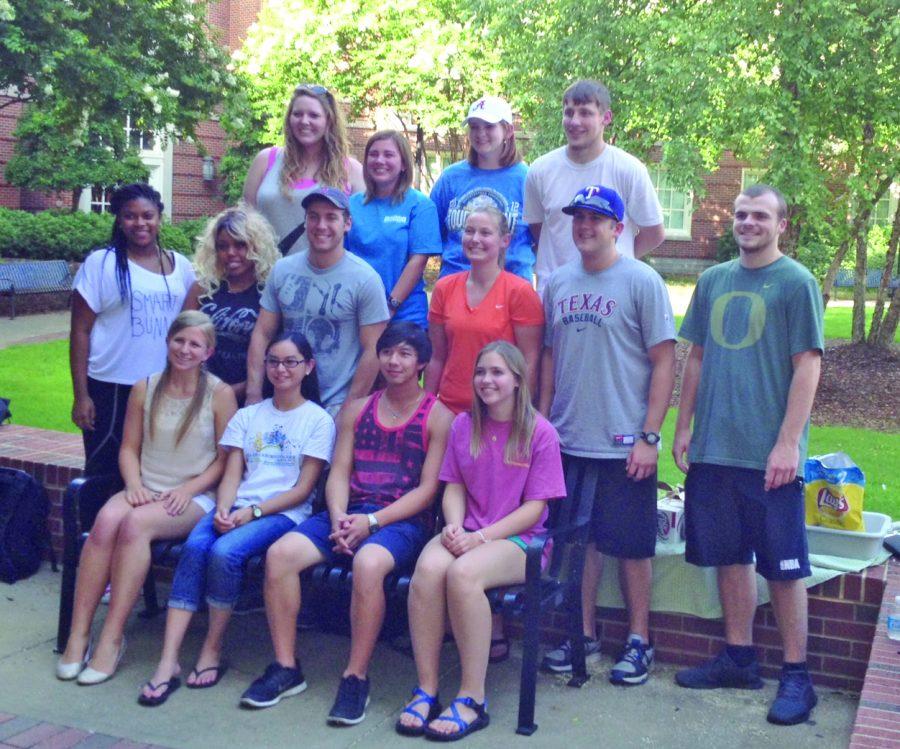Students at The University of Alabama have been encouraged to pursue STEM majors and careers through undergraduate research, clubs, societies and programs. Now, the Noyce Scholars Program, in its first year at the University, is joining that push.
Dennis Sunal, a UA professor in post-secondary science education and director of the program, said that he has wanted to bring the Noyce Scholars Program to the University for more than 10 years. The two primary goals of the program are increasing and diversifying the number of college students who graduate in the fields of chemistry, math or physics and encouraging those graduates to consider teaching in high-needs secondary schools across Alabama.
“For students who are starting out in the [STEM] programs, we would like them to continue on,” Sunal said. “Provide some support, provide them with some type of career orientation and exploration so they can see, ‘Well, where can I go with my chemistry major?’ or ‘Where can I go with my math major?’ And so, the second part is getting these majors to recognize that one major occupation area in these fields is teaching.”
One of the UA participants, LizAnne Espy, a sophomore majoring in math, said even though she is not sure what career she wants to pursue, the internship opened her eyes to the array of possibilities available to her as a math major.
“We took a lot of tours of the engineering buildings, and we saw all the technology they use, and we went to Matthews Elementary School and helped with their [Summer Enrichment Workshop] program,” she said. “It was cool to see how broad science is and what all you can do with it and [how you can] use it in different occupations and different ways.”
Marilyn Stephens, a former high school teacher who is pursuing a doctorate in post-secondary science education, is project coordinator for the UA Noyce internship and said the need for chemistry and physics teachers at the high school level is tremendous across the country.
“Sixty-one percent of chemistry teachers, nationwide, are teaching without a concentration in chemistry. Sixty six percent of physics teachers are teaching without a concentration in physics,” Stephens said. “Of that 61 and 66 percent, some aren’t even certified to teach either subject.”
Participating in the UA Noyce internship is one way to show students all that can be done with a major in chemistry, math or physics. UA participant, AnnaCarrol Jones, a sophomore majoring in chemistry, said the internship was a good introduction to various STEM jobs, but with a focus on teaching.
“With [the involvement in S.E.W.], we were just observing teachers, seeing how they did lesson plans. We also had interviews with teachers,” she said. “We had a teacher panel and asked them how their day-by-day went and all that kind of stuff.”
In addition to the panel of teachers at Matthews Elementary, they were able to talk to a panel of UA professors who are conducting research, so they were exposed to a variety of job outlooks.
“I liked meeting all the different professors and seeing how they got to their point in life, because there were so many paths to different jobs,” Jones said.
The program also reaches out to students attending community colleges in Alabama. This year, seven of the 14 students who participated in the UA Noyce summer internship were from community colleges, and one of next year’s goals is to expand outreach to more community colleges.
By targeting students in community colleges, the University can extend to them the opportunity to apply for a scholarship that could fund the junior and senior years of their college education, regardless of their participation in the UA Noyce internships. A portion of the grant money is used to provide eligible juniors and seniors up to $16,000 a year. In exchange for each year they are awarded the scholarship, they must work for two years at a needs-based school in Alabama in their chosen field.
The idea, Stephens said, is that they will have graduated with one degree in chemistry, math or physics and another degree in secondary education. In this way, Noyce Scholars would help close the gap of unqualified STEM teachers throughout secondary schools in Alabama, increase the quality of education in those schools and possibly encourage those students to seek out degrees and professions in STEM fields.
Since most students who major in STEM fields usually lack in teaching backgrounds, the Noyce program strives to improve the quality of potential faculty, Sunal said.
“This program is attempting to create new teachers, who are going out in the field, so that we don’t have to continue to retrain the old teachers or the in-service teachers,” he said. “These new teachers will come up prepared to teach their areas in the way that produces the highest achievement in secondary school students.”









